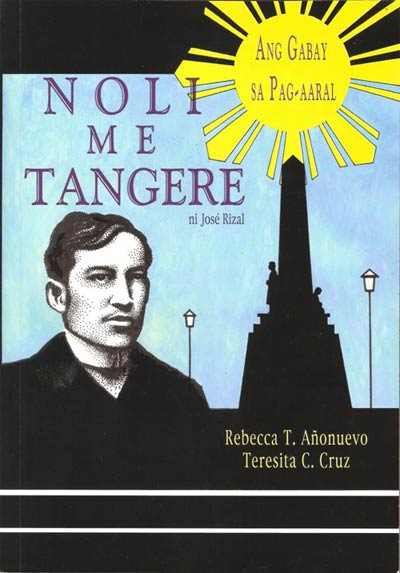
Having completed his studies in Europe, young Juan Crisóstomo Ibarra y Magsalin came back to the Philippines after a 7-year absence. In his honor, Don Santiago de los Santos "Captain Tiago" a family friend, threw a welcome home party, attended by friars and other prominent figures. One of the guests, former San Diego curate Fray Dámaso Vardolagas, belittled and slandered Ibarra.
The next day, Ibarra visits María Clara, his betrothed, the beautiful daughter of Captain Tiago and affluent resident of Binondo.
Their long-standing love was clearly manifested in this meeting, and
María Clara cannot help but reread the letters her sweetheart had
written her before he went to Europe. Before Ibarra left for San Diego,
Lieutenant Guevara, a Civil Guard, reveals to him the incidents preceding the death of his father, Don Rafael Ibarra, a rich hacendero of the town.
According to Guevara, Don Rafael was unjustly accused of being a
heretic, in addition to being a subversive — an allegation brought forth
by Dámaso because of Don Rafael's non-participation in the Sacraments, such as Confession and Mass.
Fr. Dámaso's animosity towards Ibarra's father is aggravated by another
incident when Don Rafael helped out in a fight between a tax collector
and a child, with the former's death being blamed on him, although it
was not deliberate. Suddenly, all those who thought ill of him surfaced
with additional complaints. He was imprisoned, and just when the matter
was almost settled, he died of sickness in jail.
Revenge was not in Ibarra's plans, instead he carried through his
father's plan of putting up a school, since he believed education would
pave the way to his country's progress (all throughout the novel, the
author refers to both Spain and the Philippines as two different
countries but part of the same nation or family, with Spain seen as the
mother and the Philippines as the daughter). During the inauguration of
the school, Ibarra would have been killed in a sabotage had Elías — a
mysterious man who had warned Ibarra earlier of a plot to assassinate
him — not saved him. Instead the hired killer met an unfortunate
incident and died.
After the inauguration, Ibarra hosted a luncheon during which Fr.
Dámaso, gate-crashing the luncheon, again insulted him. Ibarra ignored
the priest's insolence, but when the latter slandered the memory of his
dead father, he was no longer able to restrain himself and he lunged at
Dámaso, prepared to stab him for his impudence. Consequently, Dámaso excommunicated
Ibarra, taking this opportunity to persuade the already-hesitant Tiago
to forbid his daughter from marrying Ibarra. The friar wanted María
Clara to marry Linares, a Peninsular who just arrived from Spain.
With the help of the Governor-General, Ibarra's excommunication was
nullified and the Archbishop decided to accept him as a member of the Church .
Soon, a revolt happened and the Spanish officials and friars
implicated Ibarra as its mastermind. Thus, he was arrested and detained.
As a result, he was disdained by those who became his friends.
Meanwhile, in Capitán Tiago's residence, a party was being held to
announce the upcoming wedding of María Clara and Linares. Ibarra, with
the help of Elías, took this opportunity to escape from prison. Before
leaving, Ibarra spoke to María Clara and accused her of betraying him,
thinking she gave the letter he wrote her to the jury. María Clara
explained that she would never conspire against him, but that she was
forced to surrender Ibarra's letter to Father Salvi, in exchange for the
letters written by her mother even before she, María Clara, was born.
María Clara, thinking Ibarra had been killed in the shooting
incident, was greatly overcome with grief. Robbed of hope and severely
disillusioned, she asked Dámaso to confine her to a nunnery. Dámaso
reluctantly agreed when she threatened to take her own life, demanding,
"the nunnery or death!"[2] Unbeknownst to her, Ibarra was still alive and able to escape. It was Elías who had taken the shots.
It was Christmas Eve when Elías woke up in the forest fatally
wounded. It is here where he instructed Ibarra to meet him. Instead,
Elías found the altar boy Basilio cradling his already-dead mother,
Sisa. The latter lost her mind when she learned that her two sons,
Crispín and Basilio, were chased out of the convent by the sacristan
mayor on suspicions of stealing sacred objects.
Elías, convinced he would die soon, instructs Basilio to build a
funeral pyre and burn his and Sisa's bodies to ashes. He tells Basilio
that, if nobody reaches the place, he was to return later and dig as he
would find gold. Elías further tells Basilio to take the gold he finds
and go to school. In his dying breath, he instructed Basilio to continue
dreaming about freedom for his motherland with the words:
| “ | I shall die without seeing the dawn break upon my homeland. You, who shall see it, salute it! Do not forget those who have fallen during the night. | ” |
Elías died thereafter.
In the epilogue, it was explained that Tiago became addicted to opium
and was seen to frequent the opium house in Binondo to satiate his
addiction. María Clara became a nun when Salví, who had lusted after her
from the beginning of the novel, regularly used her to fulfill his
lust. One stormy evening, a beautiful insane woman was seen at the top
of the convent crying and cursing the heavens for the fate it had handed
her. While the woman was never identified, it is insinuated that the
said woman was María Clara.
No comments:
Post a Comment